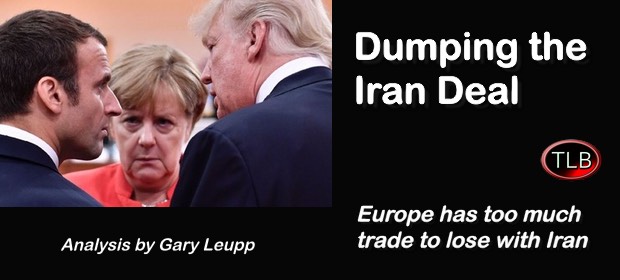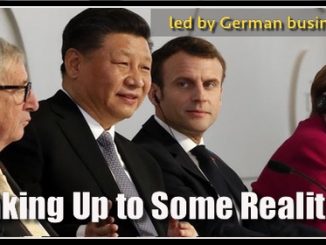
ER Editor: as of yesterday, RT is reporting that the EU is preparing to defend its profitable trade turf with Iran through the World Trade Organization (‘US is not economic policeman’: EU will go to WTO if US action hurts business in Iran):
The European Union has moved to protect the interests of its companies that do business in Iran, following the United States decision to withdraw from the 2015 nuclear deal.
President Donald Trump’s announcement that the US was withdrawing from the landmark pact unleashed a wave of criticism from the international community. Now the EU has threatened to take the US to the World Trade Organization (WTO) if it takes any steps that will negatively impact European business in the Middle Eastern country.
************
How Will Europe React to Trump’s Dumping the Iran Deal?

Photo by European People’s Party | CC BY 2.0
People are asking how Iran will respond to Trump’s announcement about US withdrawal from the Joint Comprehensive Plan of Action signed by Iran, the US, UK, France, Germany, China and Russia in July 2015. I wonder how Germany, the world’s fourth largest economy, will react. Last month in her summit with Trump, Angela Merkel reiterated German strong support for the agreement. I wonder how France will respond. Emmanuel Macron, who also had a summit with Trump last month, reiterated French ongoing support. I wonder how Britain will respond. Theresa May has called the agreement “vital” and British foreign minister Boris Johnson is in Washington urging continuation of the deal.
Germany and France are among Iran’s top ten trade partners (despite the sanctions). They want to expand trade with and investment in the world’s 27th largest economy. With a huge territory, well-educated population of 80 million, rich natural resources and receptiveness to foreign capital, Iran looks like an attractive investment opportunity.
Germany comprises 60% of EU investment in Iran. It sells machinery, metals, chemicals and vehicles, and agricultural products and has a substantial trade surplus with the country. Its investments have been increasing by about 25% annually in recent years. German capitalists have been looking forward to this day. In January the Iranian Khodro auto manufacturer signed an agreement with Daimler to produce Mercedes-Benz cars in Iran beginning this year. These are the kind of deals the US now wants to thwart by discouraging their international financing and applying sanctions on those who defy its geopolitical objectives. One can expect mounting resentment to the US in Germany if the US is seen as consistently demanding that German capitalists defer to US policy in Iran and elsewhere.
Friction over Iran policy occurs as the German economy remains hurt by the application of sanctions against Russia. These were demanded by Washington following the events of 2014, supposedly in response to Russian aggression in Ukraine. (In fact, a US-backed coup designed to produce regime change, NATO membership, the expulsion of Russia from its historic naval bases in Crimea and their acquisition by NATO provoked a predictable Russian response, whereupon Washington howled in protest, applied sanctions and demanded its western partners do so, too.) A study completed last last year states that the sanctions had cost Russia some $65 billion, while counter-sanctions had cost the US and Europe over $50 billion. 40% of the latter were German losses.
 Many prominent Germans oppose the sanctions. Former chancellor Gerhard Schröder (pictured) (Merkel’s predecessor for seven years) opposes the sanctions (and indeed says he can understand the reasons for the Russian seizure of Crimea). The minister presidents of Saxony-Anhalt and Thuringia have both called for an end to the sanctions, which are particularly damaging to their economies. They are widely understood to have been adopted by the EU under US pressure (aided by the UK—so long as it was a member—as Washington’s main agent within the EU) steering the union towards unwanted confrontation with Russia at US behest.
Many prominent Germans oppose the sanctions. Former chancellor Gerhard Schröder (pictured) (Merkel’s predecessor for seven years) opposes the sanctions (and indeed says he can understand the reasons for the Russian seizure of Crimea). The minister presidents of Saxony-Anhalt and Thuringia have both called for an end to the sanctions, which are particularly damaging to their economies. They are widely understood to have been adopted by the EU under US pressure (aided by the UK—so long as it was a member—as Washington’s main agent within the EU) steering the union towards unwanted confrontation with Russia at US behest.
Meanwhile multiple imperialist wars in the Middle East are flooding Europe, especially Germany, with refugees. It’s as though the US has demanded that Europe handle the human cost of its reckless, disastrous interventions in adjoining regions. (Why can’t we just bomb them out, then you folks take them in? Or if not, build yourself some walls, and if the Muslims don’t go away, lock ’em up!)
 As the US seriously opposes trade (“free trade”) between Iran and Europe, demanding renewed “secondary sanctions,” US-European frictions already at an unprecedented high (given such idiotic decisions as leaving the Kyoto Accord and recognizing Jerusalem as the capital of Israel, to say nothing of the general disgust with Trump as US president), general inter-Atlantic tensions will likely rise. Trump is already abysmally unpopular in Europe, and most Europeans for the first time tell pollsters that their view of the US is more negative than positive.
As the US seriously opposes trade (“free trade”) between Iran and Europe, demanding renewed “secondary sanctions,” US-European frictions already at an unprecedented high (given such idiotic decisions as leaving the Kyoto Accord and recognizing Jerusalem as the capital of Israel, to say nothing of the general disgust with Trump as US president), general inter-Atlantic tensions will likely rise. Trump is already abysmally unpopular in Europe, and most Europeans for the first time tell pollsters that their view of the US is more negative than positive.
Italy and Greece buy Iranian crude oil and also support the JCPA. In fact, everybody does, except for Binyamin Netanyahu (who has Trump tied around his finger), Trump, the US Congress, and ferociously anti-Shiite Sunni Arab monarchs, most notably King Salman of Saudi Arabia. It was affirmed by the United Nations by the UNSC resolution 2231 (2015). If the US successfully sabotages it (not that this will be possible, as Condi Rice has recently remarked), Europe will be pissed. So will Russia and China, who are deepening ties with Iran. China is the first or second top trading partner with Iran, rivaling the UAE. It has plans to integrate Iran into the Shanghai Cooperation Organization.
CONTINUE READING HERE
ER recommends other articles by Counterpunch
Featured image: John Macdougall / AFP/Getty Images




